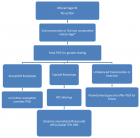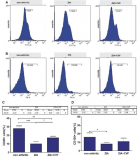Abstract
Research Article
Control of arterial hypertension and risk of new-onset of atrial fibrillation in patients with metabolic syndrome
Ylber Jani*, Kastriot Haxhirexha, Ferizat Haxhirexha, Bekim Pocesta, Atila Rexhepi, Fatmir Ferati, Ahmet Kamberi, Agim Zeqiri, Sotiraq Xhunga, Artur Serani and Lutfi Zylbeari
Published: 10 March, 2022 | Volume 7 - Issue 1 | Pages: 017-022
Background: An association between Atrial Fibrillation (AF) and Metabolic Syndrome (MS) a constellation of abnormalities (high blood pressure, hyperglycemia, dyslipidemia, and abdominal obesity), has been demonstrated. There have been many studies that have shown that elevated blood pressure (BP), was significantly associated with an increased risk of AF. It is uncertain whether maintaining the optimal BP levels can prevent AF in the patients with MS categorized as ‘high-risk’ patients.
Objective: The aim of this study was to evaluate the influence of control of BP on the occurrence of new-onset atrial fibrillation in patients with Metabolic Syndrome.
Methods: Into this observational study, was enrolled 435 consecutive patients (210 males and 225 females) aged 45-79 years who fulfilled criteria for MS. Participants were selected among primary and secondary care patients, who were receiving ongoing care for arterial hypertension in the period from November 2018 till November 2021. The study was conducted at outpatients in 5 Health Care Clinics (3 Secondary Health Care Clinics and 2 Primary Health Clinics). Patient were categorized according to their BP levels as Group 1-patients with controlled BP, {(patients aged < 65 years Systolic Blood Pressure (SBP) of 120 - 130 mmHg, patients aged ≥ 65 years SBP of 130 - 139 mmHg)} and Diastolic Blood Pressure (DBP), {(patients aged < 65 years of < 80 mmHg. but not < 70 mmHg; patients aged ≥ 65 years of 85 - 89 mmHg)}, or Group 2-patients with uncontrolled BP(> 130/80 mmHg),and in patients aged ≥ 65 years BP (≥ 140/90 mmHg ).
Results: New-onset of AF, was more frequent in participants with uncontrolled BP, respectively (34.7% vs. 19.5%, p = 0.009).Patients with uncontrolled BP have more frequent persistent AF (15.2% vs. 0.04%) and permanent AF (0.08% vs. 0.02%), whereas there was not significant changes between groups in relation to frequency of paroxysmal AF, respectively (12.8% vs. 10.9%, p = 0.29). There was observed significant association of uncontrolled BP with: increased frequency of AF (OR = 2.193; 95% CI 1.390 - 3.439), persistent AF (OR = 3.931; 95% CI 1.771 - 8.084), permanent AF (OR = 4.138; 95% CI 1.383-12.381), LA. Dimension ≥ 2.2 cm/m2 (OR = 2.089, 95% CI 1.330 - 3.252), BMI (OR = 5.226, 95% CI 3.155 - 8.659) and 5-risk factors for MS, respectively (OR = 2.998, 95% CI 1.833 - 4.901).
Conclusion: Optimal BP levels, can reduce the frequency of new-onset AF in patients with MS categorized as ‘high-risk’ patients. Uncontrolled BP was associated with an increased risk of both subtypes of AF (persistent and permanent) in the patients with MS categorized as ‘high-risk’ patients.
Read Full Article HTML DOI: 10.29328/journal.jccm.1001126 Cite this Article Read Full Article PDF
Keywords:
Controlled blood pressure; Metabolic syndrome and atrial fibrillation
References
- Lane DA, Skjoth F, Lip GYH, Larsen TB, Kotecha D. Temporal trends in incidence, prevalence, and mortality of atrial fibrillation in primary care. J Am Heart Assoc. 2017; 6: 116. e005155. PubMed: https://pubmed.ncbi.nlm.nih.gov/28455344/
- Ford ES. Prevalence of Metabolic Syndrome defined by the international Diabetes Federation among adult in the US. Diabetes Care. 2005; 28: 2745-2749. PubMed: https://pubmed.ncbi.nlm.nih.gov/16249550/
- Tanner RM, Baber U, Carson AP, Voeks J, Brown TM, et al. Association of the metabolic syndrome with atrial fibrillation among United States adults (from the REasons for Geographic and Racial Differences in Stroke [REGARDS] Study). Am J Cardiol. 2011; 108: 227–232. PubMed: https://pubmed.ncbi.nlm.nih.gov/21530935/
- Karantzopoulos P, Kokoris S, Papaionnides D. The association of metabolic syndrome with atrial fibrillation:an emerging epidemiological and patophysiologica hypothesis. Cardiology. 2005; 104: 148-149. PubMed: https://pubmed.ncbi.nlm.nih.gov/16118494/
- Arthur RM, Carl JL, James DN, James OK, Daniel PM, et al. Cardiometabolic Risk Factors and Atrial Fibrillation. Rev Cardiovasc Med. 2013; 14: 73-81. PubMed: https://pubmed.ncbi.nlm.nih.gov/24448257/
- Manolis AJ, Rosel FA, Coca A. Hypertension and Atrial Fibrillation:diagnostic approach,prevention and treatment.Position paper of the Working Group “Hypertension Arrhythmias and Thombosis” of the European Society of Hypertension. J Hypertens. 2012; 30: 239-252.
- Georgiopoulos G, Ntritsos G, Stamatelopoulos K, Tsioufis C, Aimo A, et al. The relationship between blood pressure and risk of atrial fibrillation: a Mendelian randomization study. Eur J Prev Cardiol. 2021; PubMed: https://pubmed.ncbi.nlm.nih.gov/33556963/
- Paolo V, Fabio A, Gianpaolo R. Hypertension and Atrial Fibrillation: Doubts and Certainties From Basic and Clinical Studies. Circ Res. 2018; 122: 352-368. PubMed: https://pubmed.ncbi.nlm.nih.gov/29348255/
- Verdecchia P, Staessen JA, Angeli F, de Simone G, Achilli A, et al. Usual versus tight control of systolic blood pressure in non-diabetic patients with hypertension (Cardio-Sis): An open-label randomised trial. Lancet. 2009; 374: 525–533. PubMed: https://pubmed.ncbi.nlm.nih.gov/19683638/
- Chen LY, Bigger JT, Hickey KT, Chen H, Lopez-Jimenez C, et al. Effect of Intensive Blood Pressure Lowering on Incident Atrial Fibrillation and P-Wave Indices in the ACCORD Blood Pressure Trial. Am J Hypertens. 2016; 29: 1276–1282. PubMed: https://pubmed.ncbi.nlm.nih.gov/26476086/
- Ford ES, Li C, Zhao Prevelence and correlates of Metabolic Synrome based on a harmonious definition among adults in the US. J Diabetes. 2010; 2: 180-1993. PubMed: https://pubmed.ncbi.nlm.nih.gov/20923483/
- Alberti KG, Eckel RH, Grundy SM, Zimmet PZ, Cleeman JI, et al. Harmonizing the metabolic syndrome: a joint interim statement of the International Diabetes Federation Task Force on Epidemiology and Prevention; National Heart, Lung, and Blood Institute; American Heart Association; World Heart Federation; International Atherosclerosis Society; and International Association for he Study of Obesity. Circulation. 2009; 120: 1640–1645. PubMed: https://pubmed.ncbi.nlm.nih.gov/19805654/
- American Diabetes Association. Standarts for Medical Care for Patients with Diabetes Mellitus. Diabetes Care. 2002; 25: 213-229. PubMed: https://pubmed.ncbi.nlm.nih.gov/12502618/
- Williams B, Mancia G, Spiering W, Agabiti E, Azii M, et al. 2018 ESC/ESH Guidelines for the management of arterial hypertension: The Task Force for the management of arterial hypertension of the European Society of Cardiology (ESC) and the European Society of Hypertension (ESH). Eur Heart J. 2018; 39: 3021–3104. PubMed: https://pubmed.ncbi.nlm.nih.gov/30165516/
- Lang RM, Badano LP, Mor-Avi V, Afilalo J, Armstrong A, et al. Recommendations for cardiac chamber quantification by echocardiography in adults: an update from the American society of echocardiography and the European association of cardiovascular imaging. Eur Heart J Cardiovasc Imaging. 2015; 16: 233–271. PubMed: https://pubmed.ncbi.nlm.nih.gov/25559473/
- Nagueh SF, Smiseth OA, Appleton CP, Byrd BF, Dokainish H, et al. Recommendations for the evaluation of left ventricular diastolic function by echocardiography: an update from the American Society of Echocardiography and the European Association of Cardiovascular Imaging. J Am Soc Echocardiogr. 2016; 29: 277–314. PubMed: https://pubmed.ncbi.nlm.nih.gov/27037982/
- de Simone G, Daniel RS, Devereux RB, Meyer RA, Roman MJ, et al. Left ventricular mass and body size in normotensive children and adults:assessment of allometric relations and impact of overweight. J Am Coll Cardiol. 1992; 20: 1251-1260. PubMed: https://pubmed.ncbi.nlm.nih.gov/1401629/
- Huxley RR, Lopez FL, Folsom AR, Agarwal SK, Loehr LR, et al. Absolute and attributable risks of atrial fibrillation in relation to optimal and borderline risk factors: the Atherosclerosis Risk in Communities (ARIC) study. Circulation. 2011; 123: 1501–1508. PubMed: https://pubmed.ncbi.nlm.nih.gov/21444879/
- Georgiopoulos G, Ntritsos G, Stamatelopoulos K, Tsioufis C, Aimo A, et al. The relationship between blood pressure and risk of atrial fibrillation: a Mendelian randomization study. Eur J Prev Cardiol. 2021. PubMed: https://pubmed.ncbi.nlm.nih.gov/33556963/
- Verdecchia PF. Angeli P, Reboldi G. Hypertension and Atrial Fibrillation. Circulat Res. 2018; 122: 352–368. PubMed: https://pubmed.ncbi.nlm.nih.gov/29348255/
- Alves-Cabratosa L, García-Gil M, Comas-Cufí M, Ponjoan A, Martí R, et al. Incident atrial fibrillation hazard in hypertensive population: a risk function from and for clinical practice. Hypertension. 2015; 65: 1180-1186. PubMed: https://pubmed.ncbi.nlm.nih.gov/25847950/
- Verdecchia P, Mazzotta G, Angeli F, Reboldi G. Above which blood pressure level does the risk of atrial fibrillation increase? Hypertension. 2012; 59:184–185. PubMed: https://pubmed.ncbi.nlm.nih.gov/22252400/
- Soliman EZ, Rahman AF, Zhang Z, Rodriguez CJ, Chang TI, et al. Effect of Intensive Blood Pressure Lowering on the Risk of Atrial Fibrillation. Hypertension. 2020; 75: 1491–1496. PubMed: https://pubmed.ncbi.nlm.nih.gov/32362229/
- Chen LY, Bigger JT, Hickey KT, Chen H, Lopez-Jimenez C, et al. Effect of Intensive Blood Pressure Lowering on the Risk of Atrial Fibrillation and P-Wave Indices in the ACCORD Blood Pressure Trial. Am J Hypertens. 2016; 29: 1276–1282. PubMed: https://pubmed.ncbi.nlm.nih.gov/26476086/
- Whelton PK, Carey RM, Aronow WS, Casey DE Jr, Collins KJ, et al. 2017 ACC/AHA/AAPA/ABC/ACPM/AGS/APhA/ASH/ASPC/ NMA/PCNA Guideline for the Prevention, Detection, Evaluation, and Management of High Blood Pressure in Adults: a report of the American College of Cardiology/American Heart Association Task Force on Clinical Practice Guidelines. Circulation. 2018; 138: e484–e594. PubMed: https://pubmed.ncbi.nlm.nih.gov/29133354/
- de Vos CB, Pisters R, Nieuwlaat R, Prins MH, Tieleman RG, et al. Progression From Paroxysmal to Persistent Atrial Fibrillation. J Am Coll Cardiol. 2010; 55: 725–731. PubMed: https://pubmed.ncbi.nlm.nih.gov/20170808/
- Thomas MC, Dublin S, Kaplan RC, Glazer NL, Lumley T, et al. Blood Pressure Control and Risk of Incident Atrial Fibrillation. Am J Hypertens. 2008; 21: 1111–1116. PubMed: https://pubmed.ncbi.nlm.nih.gov/18756257/
- Sandhu RK, Conen D, Tedrow UB, Fitzgerald KC, Pradhan AD, et al. Predisposing Factors Associated With Development of Persistent Compared with Paroxysmal Atrial Fibrillation. J Am Heart Assoc. 2014; 3: e000916. PubMed: https://pubmed.ncbi.nlm.nih.gov/24786144/
- Healey JS, Connolly SJ. Atrial fibrillation: hypertension as a causative agent, risk factor for complications, and potential therapeutic target. Am J Cardiol. 2003; 91: 9G-14G. PubMed: https://pubmed.ncbi.nlm.nih.gov/12781903/
- Vaziri SM, Larson MG, Lauer MS, Benjamin EJ, Levy D. Influence of blood pressure on left atrial size. The Framingham Heart study.Hypertension. 1995; 25: 1155–1160. PubMed: https://pubmed.ncbi.nlm.nih.gov/7768556/
- Okin PM, Gerdts E, Wachtell K, Oikarinen L, Nieminen MS, et al. Relationship of left atrial enlargement to persistence or development of ECG left ventricular hypertrophy in hypertensive patients: implications for the development of new atrial fibrillation. J Hypertens. 2010; 28: 1534–1540. PubMed: https://pubmed.ncbi.nlm.nih.gov/20589977/
- Francesca C, Anna M, Pierdomenico U, Matteo De R, Andrea De L, et al. Ambulatory blood pressure and risk of new-onset atrial fibrillation in treated hypertensive patients. J Clin Hypertens (Greenwich). 2021; 23: 147-152. PubMed: https://pubmed.ncbi.nlm.nih.gov/33242233/
- Larsson SC, Back M, Rees J, Mason AM, Burgess S. Body mass index and body composition in relation to 14 cardiovascular conditions in UK Biobank: a Mendelian randomization study. Eur Heart J. 2020; 41: 221–226. PubMed: https://pubmed.ncbi.nlm.nih.gov/31195408/
Similar Articles
Recently Viewed
-
Trends in TeledentistryRudrakshi C*. Trends in Teledentistry. J Clin Adv Dent. 2020: doi: 10.29328/journal.jcad.1001014; 4: 004-005
-
Au26-35: A Special Geometrical Structure of Au33 (D2) Cluster with Highly Occupied - 14 Pairs of Double-State DegeneracyK Vishwanathan*. Au26-35: A Special Geometrical Structure of Au33 (D2) Cluster with Highly Occupied - 14 Pairs of Double-State Degeneracy. Ann Adv Chem. 2022: doi: 10.29328/journal.aac.1001035; 6: 063-080
-
Texture of Thin Films of Aluminum Nitride Produced by Magnetron SputteringStrunin Vladimir Ivanovich,Baranova Larisa Vasilievna*,Baisova Bibigul Tulegenovna. Texture of Thin Films of Aluminum Nitride Produced by Magnetron Sputtering. Int J Phys Res Appl. 2025: doi: 10.29328/journal.ijpra.1001106; 8: 013-016
-
Minimising Carbon Footprint in Anaesthesia PracticeNisha Gandhi and Abinav Sarvesh SPS*. Minimising Carbon Footprint in Anaesthesia Practice. Int J Clin Anesth Res. 2024: doi: 10.29328/journal.ijcar.1001025; 8: 005-007
-
On Friedman equation, quadratic laws and the geometry of our universeS Kalimuthu*. On Friedman equation, quadratic laws and the geometry of our universe. Int J Phys Res Appl. 2021: doi: 10.29328/journal.ijpra.1001041; 4: 048-050
Most Viewed
-
Evaluation of Biostimulants Based on Recovered Protein Hydrolysates from Animal By-products as Plant Growth EnhancersH Pérez-Aguilar*, M Lacruz-Asaro, F Arán-Ais. Evaluation of Biostimulants Based on Recovered Protein Hydrolysates from Animal By-products as Plant Growth Enhancers. J Plant Sci Phytopathol. 2023 doi: 10.29328/journal.jpsp.1001104; 7: 042-047
-
Sinonasal Myxoma Extending into the Orbit in a 4-Year Old: A Case PresentationJulian A Purrinos*, Ramzi Younis. Sinonasal Myxoma Extending into the Orbit in a 4-Year Old: A Case Presentation. Arch Case Rep. 2024 doi: 10.29328/journal.acr.1001099; 8: 075-077
-
Feasibility study of magnetic sensing for detecting single-neuron action potentialsDenis Tonini,Kai Wu,Renata Saha,Jian-Ping Wang*. Feasibility study of magnetic sensing for detecting single-neuron action potentials. Ann Biomed Sci Eng. 2022 doi: 10.29328/journal.abse.1001018; 6: 019-029
-
Pediatric Dysgerminoma: Unveiling a Rare Ovarian TumorFaten Limaiem*, Khalil Saffar, Ahmed Halouani. Pediatric Dysgerminoma: Unveiling a Rare Ovarian Tumor. Arch Case Rep. 2024 doi: 10.29328/journal.acr.1001087; 8: 010-013
-
Physical activity can change the physiological and psychological circumstances during COVID-19 pandemic: A narrative reviewKhashayar Maroufi*. Physical activity can change the physiological and psychological circumstances during COVID-19 pandemic: A narrative review. J Sports Med Ther. 2021 doi: 10.29328/journal.jsmt.1001051; 6: 001-007

HSPI: We're glad you're here. Please click "create a new Query" if you are a new visitor to our website and need further information from us.
If you are already a member of our network and need to keep track of any developments regarding a question you have already submitted, click "take me to my Query."


















































































































































